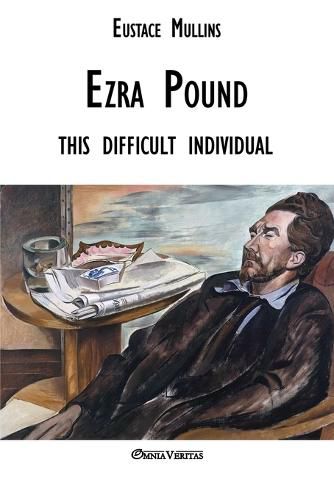Readings Newsletter
Become a Readings Member to make your shopping experience even easier.
Sign in or sign up for free!
You’re not far away from qualifying for FREE standard shipping within Australia
You’ve qualified for FREE standard shipping within Australia
The cart is loading…






This title is printed to order. This book may have been self-published. If so, we cannot guarantee the quality of the content. In the main most books will have gone through the editing process however some may not. We therefore suggest that you be aware of this before ordering this book. If in doubt check either the author or publisher’s details as we are unable to accept any returns unless they are faulty. Please contact us if you have any questions.
EZRA POUND was born on October 30, 1885, in Hailey, Idaho. He was the son of Homer Loomis Pound and Isabel Weston Pound. In later years, the sculptor Lekakis humourously referred to Ezra as Homer’s son , a mot that was repeated among the Greeks. Hailey was a frontier town, such as those that can be seen today on any American television screen. Homer Pound was employed in the government land office. Ezra recalls seeing some burly gentlemen striding about with large six shooters strapped to their waists. In 1888, Homer Pound was appointed assayer to the United States Mint in Philadelphia. The family was caught in the famed Blizzard of ‘88 during their return to the East. They settled in Wyncote, Pennsylvania, a prosperous suburb, with such neighbors as a certain Mr. Curtis, who published a well-known periodical of that era.
Ezra’s interest in money as a phenomenon, in contrast to the usual attitude toward money as something to get, is a legitimate one. His paternal grandfather, Thaddeus Coleman Pound, had been a pioneer railroad-builder and lumberman in Wisconsin. He served several terms as a Congressman and became an ardent advocate of monetary reform. While he was in Washington, his lumber interests were wiped out by the rapid expansion of the Weyerhaeuser firm. He returned home to salvage what he could, and for a time, he paid his workers in scrip money. Ezra inherited a few bills of this unique currency, and used one of them as an illustration for his own monetary theories.
$9.00 standard shipping within Australia
FREE standard shipping within Australia for orders over $100.00
Express & International shipping calculated at checkout
This title is printed to order. This book may have been self-published. If so, we cannot guarantee the quality of the content. In the main most books will have gone through the editing process however some may not. We therefore suggest that you be aware of this before ordering this book. If in doubt check either the author or publisher’s details as we are unable to accept any returns unless they are faulty. Please contact us if you have any questions.
EZRA POUND was born on October 30, 1885, in Hailey, Idaho. He was the son of Homer Loomis Pound and Isabel Weston Pound. In later years, the sculptor Lekakis humourously referred to Ezra as Homer’s son , a mot that was repeated among the Greeks. Hailey was a frontier town, such as those that can be seen today on any American television screen. Homer Pound was employed in the government land office. Ezra recalls seeing some burly gentlemen striding about with large six shooters strapped to their waists. In 1888, Homer Pound was appointed assayer to the United States Mint in Philadelphia. The family was caught in the famed Blizzard of ‘88 during their return to the East. They settled in Wyncote, Pennsylvania, a prosperous suburb, with such neighbors as a certain Mr. Curtis, who published a well-known periodical of that era.
Ezra’s interest in money as a phenomenon, in contrast to the usual attitude toward money as something to get, is a legitimate one. His paternal grandfather, Thaddeus Coleman Pound, had been a pioneer railroad-builder and lumberman in Wisconsin. He served several terms as a Congressman and became an ardent advocate of monetary reform. While he was in Washington, his lumber interests were wiped out by the rapid expansion of the Weyerhaeuser firm. He returned home to salvage what he could, and for a time, he paid his workers in scrip money. Ezra inherited a few bills of this unique currency, and used one of them as an illustration for his own monetary theories.